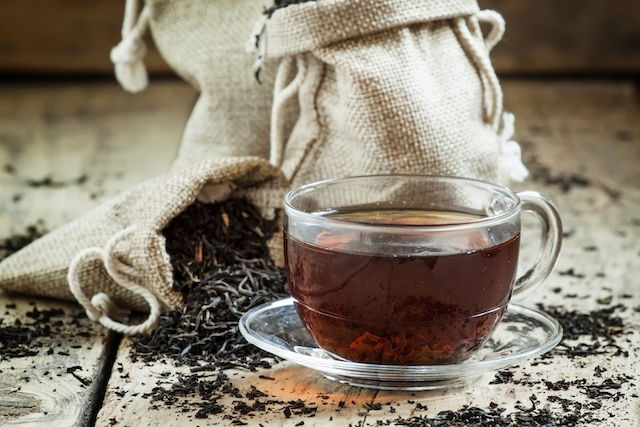Black tea is rich in antioxidants, like catechins and polyphenols, which help to neutralize free radicals and reduce system inflammation. It is one of the most consumed drinks in the world.
Because of its properties, black tea can offer many diverse health benefits, like improving digestion, managing diabetes, promoting weight loss and preventing illnesses like cancer or heart attacks.
The difference between green tea and black tea is the way the leaves are handles. Both teas use leaves of the same plant, Camellia sinensis, however with green tea, the leaves are fresh and exposed to little heat. Black tea uses oxidized leaves, which provides a more intense flavor with different medicinal properties.

Health benefits
Black tea can offer the following health benefits:
1. Preventing early aging
Black tea contains great quantities of antioxidants that prevent over-oxidization from free radicals. It can prevent damage at a cellular level, which keeps cells healthier for longer.
2. Promoting digestion and treating diarrhea
Black tea is a great option for relieving a full stomach, It acts directs on the digestive system to promote digestion and detox.
Furthermore, black tea contains tannins, which help to relieve intestinal inflammation. It can be beneficial for treating abdominal pain and decreasing diarrhea.
3. Decreasing appetite
Drinking a cup of black tea on a regular basis for at least 3 months can help reduce appetite and accelerate metabolism, promoting weight loss. It is believed that this benefit is possible due to black tea’s high antioxidant potency, which comes from the flavonoids and caffeine it contains.
Although black tea can reduce appetite and help with weight loss, it should be used as a part of a balanced, low-fat and low-sugar diet that prioritizes fruits, vegetables, whole grains seeds and dish. You should also engage in physical activity, like regular 30 minute walks.
4. Diabetes management
Black tea contains phenolic compounds that help to regulate blood glucose levels, making it a great complement to diabetes or pre-diabetes treatment. It has a curative effect on beta-cells in the pancreas.
5. Skin health
Applying black tea directly on the skin is a great way to treat acne and oiliness. Prepare the tea as normal, and soak a gauze or cotton in the infusion while it is still warm. Then apply directly on the affected areas of the skin for a few minutes, before removing and cleansing the skin.
6. Decreasing cholesterol
Black tea extract promotes increased metabolism of cholesterol, and can be used for the prevention or metabolic syndrome. This effect is likely due to black tea’s ability to inhibit the of reabsorption of biliary acids.
7. Preventing atherosclerosis and infarct
Black tea is rich in flavonoids, which are known to be cardio-protective. These flavonoids prevent the oxidation of LDL cholesterol that causes plaques along blood vessels and are associated with atherosclerosis.
8. Mental alertness
Another benefit of black tea is that is promotes mental alertness. It contains caffeine and L-theanine, which boost cognitive performance and increase your level of consciousness. Black tea is a great breakfast or post-lunch option, and its effect is usually noted 30 minutes after drinking.
9. Preventing cancer
Because it contains catechins, black tea can help to prevent and treat cancer. It is believed to have a protective effect on DNA cells, and that it also induces cell death in tumor cells.
How to make black tea
Black tea can be prepared using dehydrated leaves, which can be found in bulk or in teabags. To benefits from all that black tea has to offer, you should make as outlined:
Ingredients
- 1 cup of boiling water
- 1 tea bag with black tea leaves, or 1 teaspoon of dried black tea leaves
How to prepare
Add the tea bag or leaves to the cup of hot water, cover, and allow to soak for 5 minutes. Then strain and drink while warm, sweetened or unsweetened.
To achieve a smoother black tea taste, you can add warm milk or the juice of half a lemon.
Side effects
Drinking moderate amounts of black tea is safe, however drinking more than 5 cups per day can lead to symptoms. Because it contains caffeine, high amounts of black tea can cause headaches, nervousness, difficulty sleeping, vomiting, irritability, tremors, stomach pain and dizziness.
Contraindications for use
Black tea is contraindicated for babies and children under 12. Women who are pregnant or breastfeeding should avoid consuming it unless under the supervision of a doctor, due to its caffeine content.
Black tea is not recommended for people with high blood pressure, as this medicinal plant as a slight hypertensive effect due to the caffeine. However, people who regularly consume black tea or other drinks with caffeine typically do not experience this effect.
This tea should be consumed in moderation by people with a known iron deficiency, as this plant contains compounds, like tannins, that decrease iron absorption. These patients should wait to drink black tea at least an hour after their main meals.






























